

Your mood and health may be affected by loss of sleep, which is why having insomnia makes it hard for individuals to maintain the motivation to recover.Īnother frustrating factor is that insomnia can also increase other areas of withdrawal & vice versa. Insomnia makes it difficult to fall and/or stay asleep because your body is out of its normal rhythm. One of these primary symptoms is insomnia. Withdrawal, since it alters brain chemistry and changes its processes along the way, is likely to cause symptoms that affect a person’s physical and mental state. Opiate withdrawal occurs when someone has stopped taking or decreases their usage of opiates after prolonged use or physical dependence. Drugs such as opiates and opioids, whether prescription or illicit, are known for causing loss of sleep during this essential period of recovery. The first few days of sobriety are typically the roughest, especially when it comes to insomnia. In fact, individuals who are recovering from addiction may not return to a normal sleeping schedule for up to six months after beginning treatment.

Sleeping patterns may be greatly affected during recovery. However, trouble with sleeping is ironically one of the main symptoms of withdrawal so while you may need sleep, your body and mind may be fighting it. Almost everyone who goes through withdrawal will experience unpleasant symptoms that could be eased with a good night’s sleep. Sleep is always important, but it is especially vital when you are trying to fight a disorder like addiction.Īddiction recovery begins with withdrawal, which is the body’s way of readjusting to suddenly not having a substance in the system. Having a normal sleeping pattern is key to living a happy and healthy life. Prescription Drug Addiction Treatment Center.


 0 kommentar(er)
0 kommentar(er)
